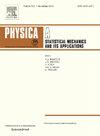On the kinetic temperature of a one-dimensional crystal on the long-time scale
IF 2.8
3区 物理与天体物理
Q2 PHYSICS, MULTIDISCIPLINARY
Physica A: Statistical Mechanics and its Applications
Pub Date : 2024-09-24
DOI:10.1016/j.physa.2024.130114
引用次数: 0
Abstract
We investigate the dynamics of the kinetic temperature of a finite one-dimensional harmonic chain, the evolution of which is initiated by a thermal shock. We demonstrate that the kinetic temperature returns arbitrarily close to its initial state (the one immediately following the thermal shock) infinitely many times, and we give an estimate for the time elapsed until the recurrence. This assertion is closely related to the Poincare recurrence theorem and we discuss their relation. To estimate the recurrence time we use its averaging along system’s trajectory and provide a rigorous mathematical definition of the mean recurrence time. It turns out that the mean recurrence time exponentially increases with the number of particles in the chain. A connection is established between this problem and the local theorems of large deviations theory.
Previous studies have shown that in such a one-dimensional harmonic chain, at times of order , a thermal echo phenomenon is observed — a sharp increase in the amplitude of kinetic temperature fluctuations. In the present work, we give a rigorous mathematical formulation to this phenomenon and estimate the amplitude of the fluctuations.
The research is funded by the Ministry of Science and Higher Education of the Russian Federation within the framework of the Research Center of World-Class Program: Advanced Digital Technologies (agreement №075-15-2020-311 dated 04.20.2022).
论一维晶体的长时间尺度动力学温度
我们研究了由热冲击引发的有限一维谐波链动力学温度的演变。我们证明了动能温度会无限多次地返回到其初始状态(紧随热冲击之后的状态),并给出了直到复现所需的时间估计值。这一论断与庞加莱复现定理密切相关,我们将讨论它们之间的关系。为了估算复发时间,我们采用了沿系统轨迹平均复发时间的方法,并给出了平均复发时间的严格数学定义。结果发现,平均递推时间随链中粒子数量的增加而呈指数增长。以前的研究表明,在这样的一维谐波链中,当时间为 N 阶时,会出现热回声现象--动能温度波动幅度急剧增加。本研究由俄罗斯联邦科学和高等教育部在世界一流计划研究中心框架内资助:该研究由俄罗斯联邦科学和高等教育部在 "世界一流计划:先进数字技术 "研究中心框架内提供资助(协议编号:075-15-2020-311,日期:04.20.2022)。
本文章由计算机程序翻译,如有差异,请以英文原文为准。
求助全文
约1分钟内获得全文
求助全文
来源期刊
CiteScore
7.20
自引率
9.10%
发文量
852
审稿时长
6.6 months
期刊介绍:
Physica A: Statistical Mechanics and its Applications
Recognized by the European Physical Society
Physica A publishes research in the field of statistical mechanics and its applications.
Statistical mechanics sets out to explain the behaviour of macroscopic systems by studying the statistical properties of their microscopic constituents.
Applications of the techniques of statistical mechanics are widespread, and include: applications to physical systems such as solids, liquids and gases; applications to chemical and biological systems (colloids, interfaces, complex fluids, polymers and biopolymers, cell physics); and other interdisciplinary applications to for instance biological, economical and sociological systems.

 求助内容:
求助内容: 应助结果提醒方式:
应助结果提醒方式:


